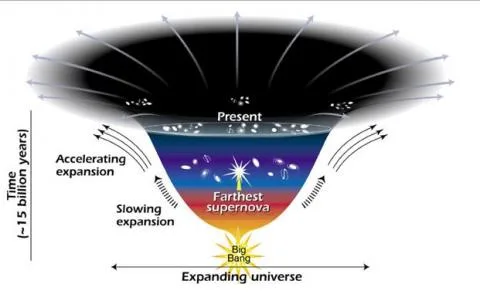Science & Technology
Dark Energy
- 28 Dec 2023
- 8 min read
For Prelims: Dark Energy, Dark Matter, Radiation
For Mains: Role of Dark Energy in Expansion of Universe.
Why In News?
The universe's energy makeup involves a delicate balance between different forms of matter and radiation.
- Dark energy, constituting a significant 68%, plays a dominant role in dictating the universe's expansion.
What is Dark Energy in the Universe?
- About:
- Dark energy is a mysterious and elusive form of energy that makes up a significant portion of the total energy content of the universe.
- It is thought to be responsible for the observed accelerated expansion of the cosmos.
- Roughly 68% of the universe is dark energy and dark matter makes up about 27%.
- The rest of everything on Earth, everything ever observed with all of our instruments, all normal matter adds up to less than 5% of the universe.
- Key points to understand about dark energy:
- Invisible Force Steering Expansion:
- Dark energy is an unseen influence responsible for the accelerated expansion of the universe. Unlike gravity, which tends to pull objects together, dark energy acts as a repulsive force, pushing galaxies away from each other.
- Characteristics of Space:
- Contrary to the notion of space being a void, dark energy introduces a new perspective. Space is not just an empty expanse; it's a dynamic, stretchable medium that responds to the presence of energy.
- Expansion Dictated by Energy Forms:
- Balancing Act:
- Dark energy dominates the universe's energy budget, and its presence dictates the overall rate at which space expands. Striking a delicate balance with other forms of energy is crucial for the stability of the cosmos.
- Implications:
- The amount of dark energy has significant implications for the observable universe.
- Adding too much positive energy could result in galaxies moving away from us faster than light, making only nearby regions visible.
- Conversely, excessive negative energy might lead to the universe collapsing to a tiny point.
- The amount of dark energy has significant implications for the observable universe.
- Diluteness of Dark Energy:
- Despite its dominance, dark energy is incredibly dilute across the vastness of the universe. In a cubic kilometer, it's as sparse as a single sugar crystal. This diluteness raises questions about the nature and distribution of this enigmatic force.
- Invisible Force Steering Expansion:
What are the Possible Explanations of Dark Energy?
- Property of Space:
- Albert Einstein was the first person to realize that empty space is not nothing.
- One version of Einstein's gravity theory, the version that contains a cosmological constant, implies that "empty space" can possess its own energy.
- Because this energy is a property of space itself, it would not be diluted as space expands. As more space comes into existence, more of this energy-of-space would appear. As a result, this form of energy would cause the universe to expand faster and faster.
- Quantum Theory of Matter:
- Another explanation for how space acquires energy comes from the quantum theory of matter.
- In this theory, "empty space" is actually full of temporary ("virtual") particles that continually form and then disappear.
- Fifth Fundamental Force:
- There are four fundamental forces in the universe, and speculative theories have proposed a fifth force, something that can’t be explained by the four forces.
- To hide or screen this fifth force, many models for dark energy use special mechanisms.
- Some theorists have named this "quintessence," after the fifth element of the Greek philosophers.
- However, none of the theories have been proved. Due to this, Dark energy has been noted as “the most profound mystery in all of science”.
UPSC Civil Services Examination, Previous Year Questions (PYQs)
Q. Which of the following is/are cited by the scientists as evidence/evidence for the continued expansion of the universe? (2012)
- Detection of microwaves in space
- Observation of redshift phenomenon in space
- Movement of asteroids in space
- Occurrence of supernova explosions in space
Select the correct answer using the codes given below:
(a) 1 and 2
(b) 2 only
(c) 1, 3 and 4
(d) None of the above can be cited as evidence
Ans: (a)
Exp:
- Arno Penzias and Robert Wilson in 1963 found mysterious microwaves coming equally from all directions. The radiation called the Cosmic Microwave Background Radiation was the radiation predicted years earlier by Gamow, Herman, and Alpher. This convinced most astronomers that the Big Bang theory was correct and provided an evidential base for continued expansion of the universe. Hence, 1 is correct.
- Edwin Hubble in 1929 measured the redshifts of a number of distant galaxies. On ploting redshift against relative distance, the redshift of distant galaxies increased as a linear function of their distance. Astronomers measure the movement of objects relative to us using Doppler shift. Light from distant objects in the universe is redshifted (shift in the frequency of light towards red colour), which tells us that the objects are all receding away from us. Hence, 2 is correct.
- Movement of an asteroid in space may provide information regarding the type of material in early universe, but as such no evidence regarding expanding universe is provided. Hence, 3 is not correct.
- The supernova explosion occurs when there is a change in the core, or centre, of a star. It happens in either binary star system or at the end of a single star’s lifetime. It helps in studying the distribution of elements throughout the universe. These elements travel on to form new stars, planets and everything else in the universe. However, it does not provide evidence for expanding universe. Hence, 4 is not correct.
Therefore, option (a) is the correct answer.







